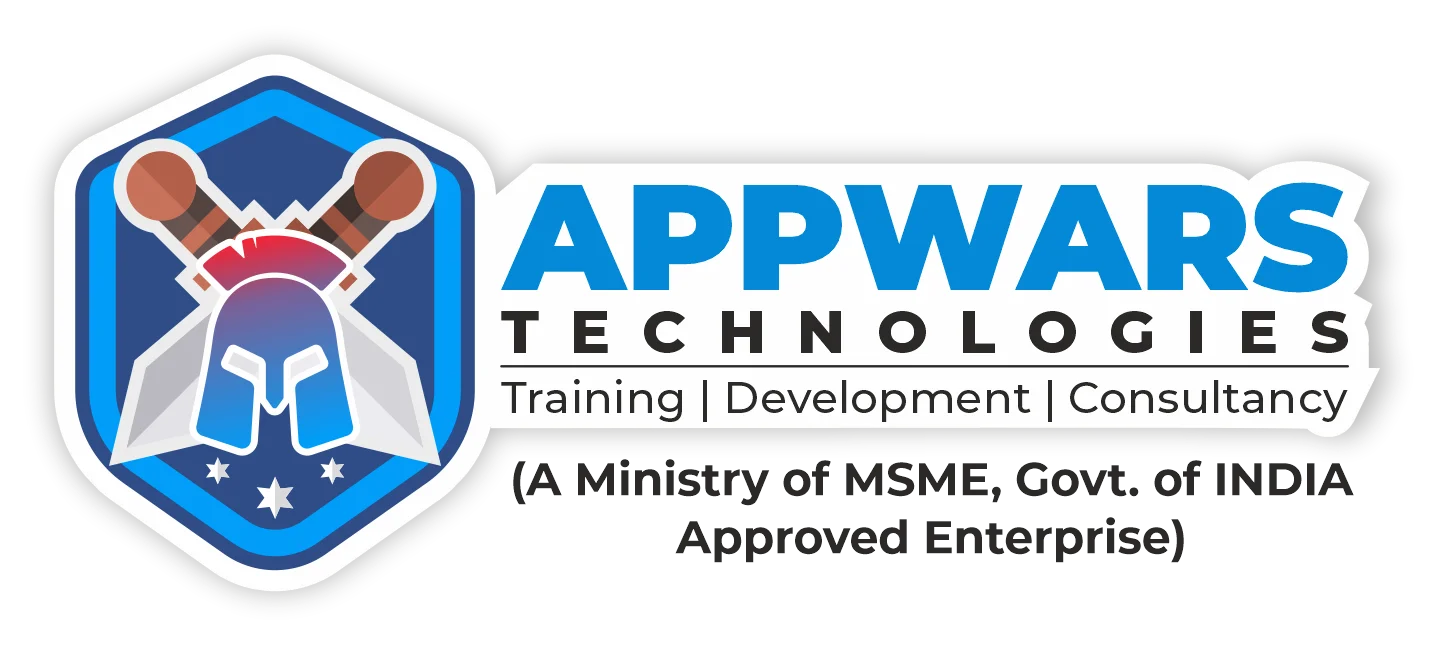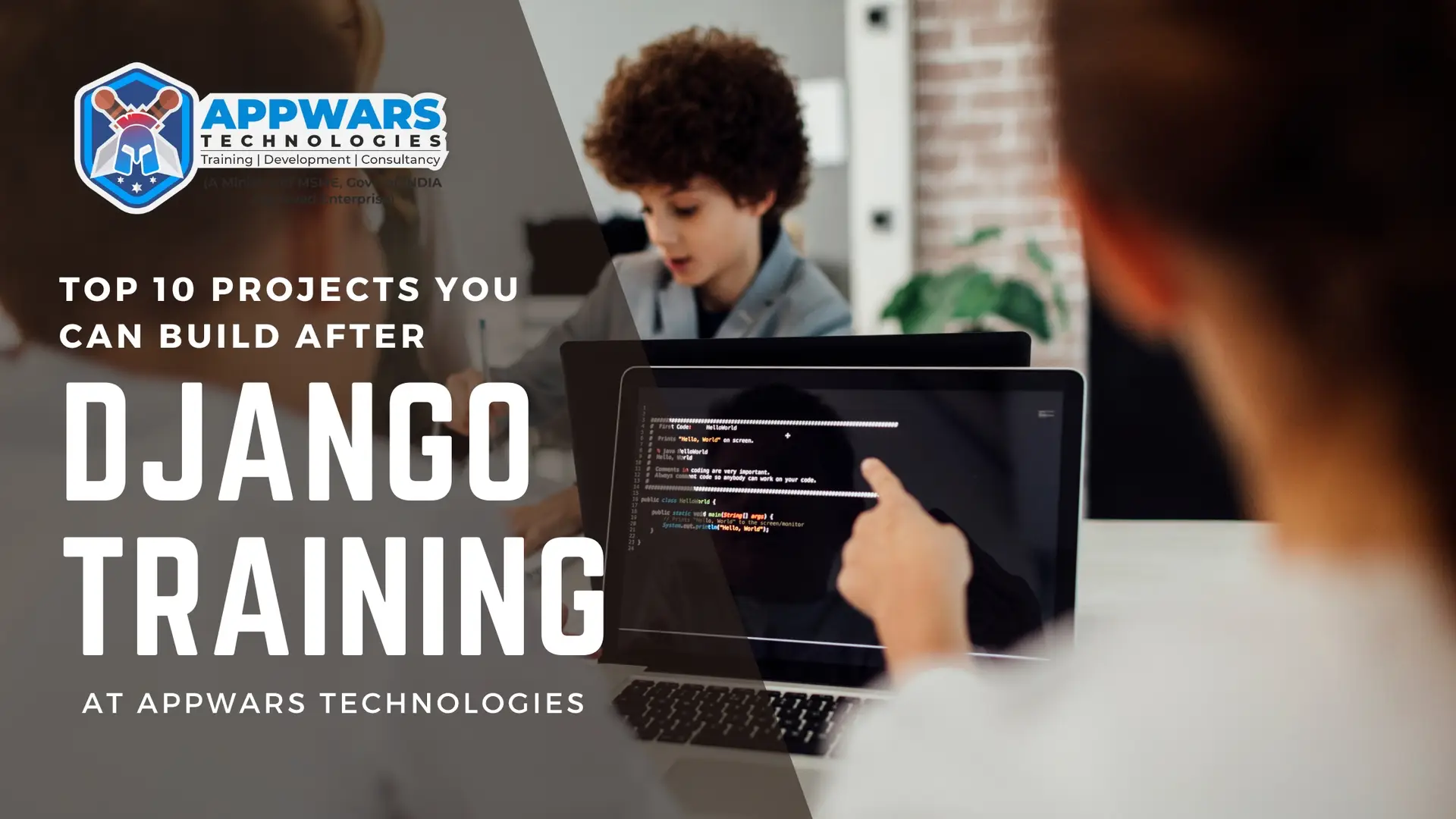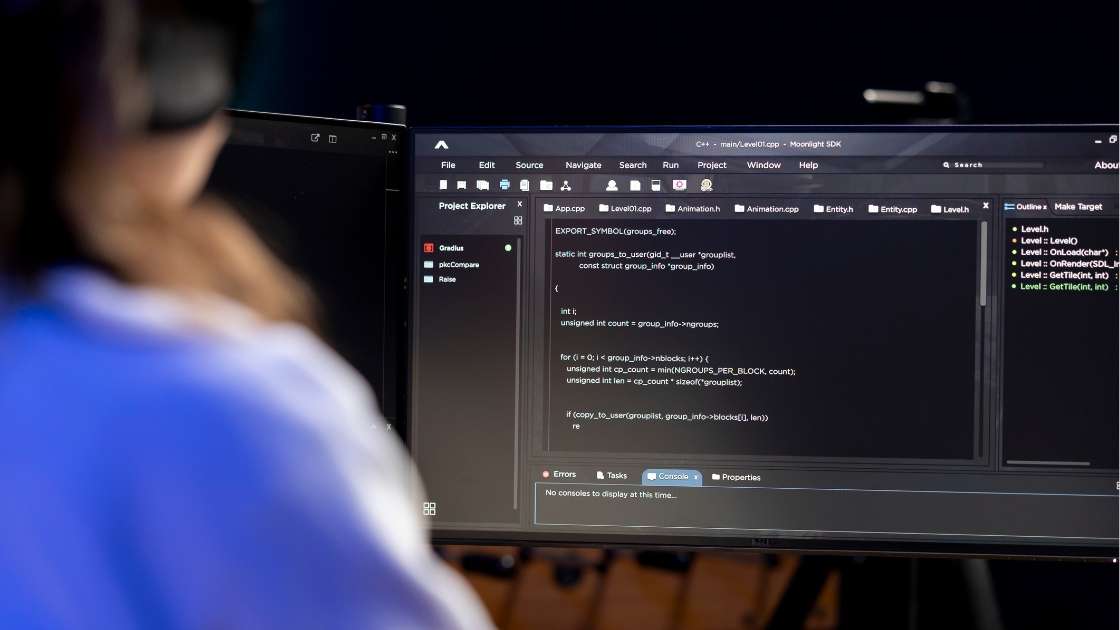Top 10 Projects You Can Build After Django Training at Appwars Technologies
Django is a robust, high level Python web framework that allows developers to build secure, maintainable, and scalable web applications quickly. At Appwars Technologies, our Django training equips learners with hands on experience and theoretical knowledge to craft dynamic websites and applications.
If you’ve completed the Django training at Appwars Technologies, you’re ready to showcase your new skills by building real world projects. These projects not only solidify your understanding but also enhance your portfolio, giving you an edge in the competitive tech landscape. In this blog, we’ll cover Top 10 Projects You Can Build After Django Training, guiding you to apply your Django knowledge effectively.
1. Personal Blog with Content Management System (CMS)
A personal blog is one of the most common yet powerful projects to start with. By building a blog, you’ll work with Django’s core functionalities like handling forms, templates, models, and the admin interface. Additionally, you can implement a simple CMS where users (bloggers) can write, edit, and delete blog posts.
Key Features:
User authentication and authorization for managing posts.
Tagging system for categorizing posts.
WYSIWYG (What You See Is What You Get) editor for writing posts.
SEO friendly URLs and meta descriptions.
Comment system for reader interactions.
Pagination and search functionalities.
Skills Used: Models, Django ORM, Templating, Django Admin, Authentication.
Why This Project?
A blog CMS gives you handson experience with CRUD (Create, Read, Update, Delete) operations, a cornerstone of web development. You’ll also be exposed to user management, URL routing, and template inheritance in Django.
2. Ecommerce Website
Ecommerce websites are dynamic, complex, and data driven applications—perfect for testing your Django skills. Building an ecommerce site will introduce you to advanced database relationships, complex views, and handling large datasets.
Key Features:
User registration, login, and profile management.
Product catalog with detailed descriptions.
Search and filter system for products.
Shopping cart and checkout system with payment gateway integration.
Order history and user specific recommendations.
Product reviews and ratings.
Admin dashboard for managing inventory, orders, and customers.
Skills Used: Django ORM, Payment Integration, User Authentication, API handling.
Why This Project?
An ecommerce site not only touches upon core Django functionalities but also challenges you to think about scalability, security, and performance optimization. Plus, it’s a fantastic addition to your portfolio that demonstrates versatility and practical application.
3. Social Media Platform
Creating a mini social media platform is a fantastic way to dive deep into user interactions, relational databases, and real time functionalities. This project will require you to implement features that foster engagement among users.
Key Features:
User registration and profile management.
Posting statuses, photos, and videos.
Follow/Unfollow functionality to connect users.
Like, comment, and share functionalities.
Notifications system for user engagement.
Realtime chat between users.
News feed algorithm for showing relevant posts.
Skills Used: User authentication, Django Channels (for WebSockets), complex querysets, database optimization.
Why This Project?
Social media platforms require interaction heavy interfaces and real time data management. You’ll explore Django’s ability to handle complex database models and integrate real time features using Django Channels.
4. Job Portal
A job portal is a great project to understand how Django handles more structured data and relationships between users and objects (jobs, companies, etc.). This project involves two types of users: job seekers and employers, offering a dual interface with different functionalities.
Key Features:
Employer login, job posting, and profile management.
Job seeker login, resume creation, and profile management.
Search, filter, and apply for jobs.
Admin dashboard for managing users and job postings.
Company profiles with job listings.
Email notifications for job alerts.
Skills Used: Forms, Sessions, User Groups/Permissions, Email Handling.
Why This Project?
Building a job portal allows you to implement advanced database models and relationships while providing realtime functionalities like job application tracking and alerts. It’s a comprehensive project that reflects the realworld needs of a job market.
5. Online Learning Platform
Online education has become more important than ever, and building a learning platform can help you explore Django’s capabilities to the fullest. This project will challenge you with multimedia content, user interaction, and performance optimization.
Key Features:
Instructor and student user roles.
Course creation and management for instructors.
Content delivery via videos, PDFs, quizzes, and assignments.
Student progress tracking and certificates.
Payment integration for paid courses.
Discussion forums and peer reviews.
Skills Used: File Handling, Django ORM, User Roles, API Integration, Video Handling.
Why This Project?
Building an online learning platform requires understanding content management, multimedia integration, and user access control. It combines multiple Django functionalities and adds value to your portfolio, particularly for the education tech sector.
6. Event Management Platform
An event management platform allows users to create and manage events while attendees can browse and register for these events. This project will involve creating a calendar based scheduling system and handling different user roles (organizers and attendees).
Key Features:
Event creation, management, and ticketing for organizers.
Event browsing and registration for attendees.
Payment gateway for paid events.
Calendar integration to show upcoming events.
Search functionality based on event type and location.
Email reminders and updates for attendees.
Skills Used: Form Handling, API Integration, Database Relationships, Django Signals.
Why This Project?
Event management involves real world challenges like handling large datasets, payment integration, and scheduling. This project demonstrates your ability to manage complex models and third party APIs in Django.
7. To Do List with Task Tracker
A ToDo list might seem simple, but you can make it more interesting by incorporating additional features like deadlines, priorities, and task sharing. This project helps you understand session management, notifications, and database handling.
Key Features:
User registration and login.
Task creation with deadlines and priority levels.
Marking tasks as completed, editing tasks, and deleting them.
Task sharing between users.
Reminder notifications for tasks with upcoming deadlines.
Skills Used: Session Management, CRUD Operations, Django Templating, Notifications.
Why This Project?
Task management apps require efficient CRUD operations and a well designed user interface. By adding features like task sharing and reminders, you can learn how to integrate third party tools and work with real time notifications.
8. Online Voting System
An online voting system offers an engaging way to understand user interactions and security at a deeper level. You’ll build a system where users can vote on polls and elections while ensuring the integrity and privacy of votes.
Key Features:
Admin creation of polls or elections.
User registration and voter verification.
Anonymous voting system with one vote per user logic.
Realtime result updates.
Admin dashboard to manage polls, view results, and moderate.
Skills Used: User Authentication, Voting Logic, Database Constraints, Django ORM.
Why This Project?
An online voting system is a highly relevant project for sectors like politics, education, and corporate environments. It demonstrates your ability to handle secure user interactions, implement complex database constraints, and manage real time data updates.
9. Portfolio Website
A personal portfolio website is essential for any developer to showcase their skills, experience, and completed projects. It’s also a perfect way to solidify your Django knowledge in a simple yet elegant project.
Key Features:
Home page with an introduction and overview.
About page detailing personal background and experience.
Project showcase with details and links to live projects.
Contact form with email integration.
Blog section for sharing articles or tutorials (optional).
Skills Used: Static File Handling, Forms, Email Handling.
Why This Project?
While a portfolio site may seem basic, it is a critical project to establish your online presence. By integrating Django, you can add dynamic features, such as a blog, and demonstrate your ability to handle form submissions and create custom designs using Django templates.
10. Library Management System
A library management system allows users to manage books, authors, borrowing status, and late fees. It’s a project that will help you work with relational databases and CRUD operations, especially in a context that requires complex data structures.
Key Features:
Admin login for managing books and borrowers.
Book search functionality by title, author, or genre.
Borrowing system with issue and return dates.
Late fees calculation and notification system.
User dashboard for tracking borrowed books and due dates.
Skills Used: Database Design, User Roles, CRUD Operations.
Why This Project?
A library management system is a good exercise for understanding relational data models, onetomany relationships, and CRUD operations in Django. It’s a highly structured project that will strengthen your foundational understanding of database management in web apps.
Conclusion
Building projects after completing Django training at Appwars Technologies is a practical way to solidify your learning and create a portfolio that stands out. Each of these projects teaches you valuable skills—from working with databases to implementing user authentication, handling multimedia content, integrating APIs, and managing real time functionalities. Not only do these projects demonstrate your technical expertise, but they also showcase your creativity and problem solving abilities.
At Appwars Technologies, we aim to prepare students for real world applications. With the knowledge you’ve gained, building these projects will sharpen your Django skills and help you become jobready. Whether you’re a beginner or intermediate, these projects cover various aspects of web development and are sure to enrich your learning experience.







